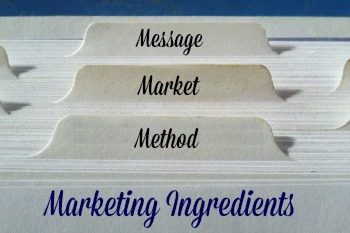Starting a business is exciting and yet stressful. To give your business the best chance of survival you will need to master many skills including management, time management, self discipline, decision-making to name but a few. Of all the skills you will need, marketing is absolutely essential. It is the heart of your business and I personally believe, your marketing skills will determine the success of your business.
It is fitting to use the metaphor that marketing is the heart of your business. Failing to market on an almost daily basis will impact your business. To be successful, your marketing should always be pumping.
Essential lessons to learn…
Be a student of marketing. Look at your competitors’ marketing. What are they saying, how are they saying it and who are they saying it too? These three elements are the essential ingredients in your marketing and you’ll discover them below. BUT, do not copy as you have no idea whether their marketing is working or not.
 So what do you really need?
So what do you really need?
1) Message – what is the message you wish to tell your potential customers about your business and your products/services? This has to resonate with them, filling a gap, adding value in some way in their lives.
2) Market – who is this message aimed at? If you know your business well, then you should have a good idea who buys your products or services. What groups do they belong to, what do they have in common? E.g. are they predominantly women aged over 40? Are they men aged under 30?
3) Method – how do you reach your target market? Is this via social media, direct mail, trade shows, personal visits etc?
By piecing all of these key elements together you will have the beginnings of a good marketing system.
Now that you know what you want to say, who to say it to and how to reach these people, the next stage is to understand how to use the different media to your advantage. If you are selling to consumers i.e. the general public, then social media should be a must. Learn how to use Facebook and Twitter as these are the two biggest social media platforms. There are numerous articles within the Yell Business Knowledge Centre to help you get started.
Learn how to use other tools of marketing or employ a marketing company to do this for you. However, be warned. If you are clear about your message, it is your job to convince the marketing consultant that this is what you want to say whilst at the same time, be open to their suggestions too. You should know your market better than them so hopefully they will work with you to improve the message rather than change it completely. At the end of the day your message is a test and nobody knows whether it will work until you enter the testing phase.
There are many other tools such as business cards, leaflets etc that you may require. Use local printers if you can, especially those who offer a design service as this could save you money. Most start-up businesses do not have large resources of cash to spend on marketing so any savings are worthwhile.
[bctt tweet=”Discover the 3 essential ingredients to start marketing your start-up business”]
Beware of these pitfalls…
1) I touched on this earlier – never copy your competitor’s marketing as you have no idea whether it’s working. Aside from that, if you say exactly what your competitor says how can a prospect choose between you? It’s likely they will make a selection based on other criteria. As a start-up business the odds are stacked against you getting the order. Do not sell on price alone (see number 2 below.)
2) Be extremely careful about selling on price. Being the cheapest in the market is usually the worst position you can hold. Why? If a competitor can sell cheaper than you, then you are out of business. Being cheap does not create customer loyalty and as soon as customers find a cheaper alternative, they will stop buying from you.
3) Nobody cares about your logo except you. Spending money on building your brand is usually wasted money. Logos are part of a brand. They provide instant recognition of who you are or that the products you sell are yours. However, brand building is expensive. What is more important is gaining a reputation for the right reasons. This could be amazing service, the broadest range of stock, ability to find unusual items, the most insightful consultancy etc. This does mean you shouldn’t pay to have business cards or a letterhead. But, create you reputation first and then, in time, as your business grows, invest in your brand.
Putting it all together
Now that you have a clearer understanding of what you need to do, let’s draw this article to a close by helping you see the big picture.
First of all, decide on your message. Be absolutely clear who your target market is. And finally, choose the tools or media to help you carry your message to your target market. When you are setting up your business, it’s impossible to use all of the marketing tools, so select the ones you consider will provide the biggest impact. This could be leaflets, signage, social media etc.

This is IMPORTANT: With all marketing, everything you do is a test. It’s impossible to get all of your marketing right first time. Even battle hardened marketing professionals cannot guarantee to get it right. This is because the people that decide whether your marketing works are your target market. Therefore invest small to begin with as everything you do is a TEST. You may find that small tests are best as long as there is a mechanism to measure.
With most of your marketing, you need to ensure it is written in a direct response format. This means include some kind of offer and request for contact so that you know that the order has derived from a specific piece of your marketing e.g. you place an advert in the newspaper with a message that asks the reader to quote a specific reference number to get the special offer. This number is coded so that you know exactly which newspaper and which advert the reader has responded to. It’s very powerful and allows you to measure how successful your marketing is.
Using the example above, the last thing you should do is place an advert in the newspaper without an offer or code. If you received an enquiry or order, unless you get into a habit of asking, how would you know that this was as a direct result of your advert?
A word about websites…
Most businesses these days have a website. Again, there are other articles that provide more detailed information on websites. Your first job is to decide why you want a website. Is it to tell potential customers you are now in business? Is it an online shop? Is the idea that you refer potential buyers to your website so that it’s almost an online leaflet? Be very clear why your website exists and please ensure you have full control of updates, amendments otherwise you could be continually paying far too much for a provider making these adjustments on your behalf.
Every piece of marketing must have a purpose. Some pieces work together and others are specific and stand alone for a reason e.g. you have a leaflet on one particular product or service or your social media works alongside your website. Understand the reasons why they exist and if they are to work alongside another piece of marketing e.g. a leaflet is always sent with a sales letter and never on its own.
This website is a super resource for you to learn about marketing. There are many other articles which will help you understand more about various aspects of marketing.
The key is always to be clear in what you are trying to achieve. Be precise in what you wish to say to your target market, test a lot, and introduce the marketing tools that you consider will best support your business during its infancy. If you have the financial resources then use good professionals as they can save you so much time, money and the cost of mistakes such as not getting customers.
I began this article by saying that marketing is the heart of your business. One of my favourite quotes is from Peter Druker who said:
“the purpose of a business is to create and keep a customer.”
Marketing and sales are the driving forces that create customers. You keep them through building relationships, serving them so well and continually communicating with them – yes, you market to existing customers too and these will be different messages from those you use to attract customers.
Now that you understand the critical importance of marketing your business, I urge you to take it seriously and either become a master of it or contract people who know what they are doing and use their expertise. One way or another, you must be marketing frequently for your business to survive and grow.
